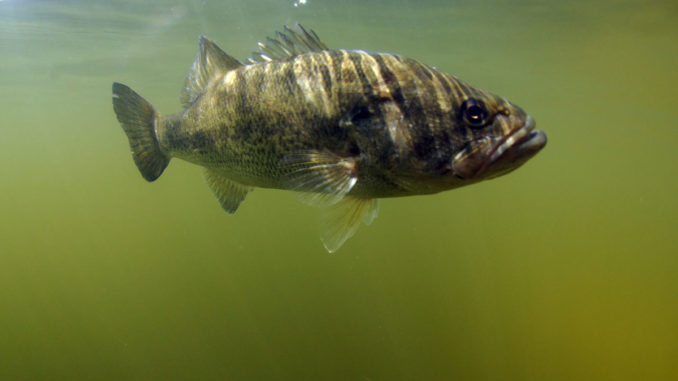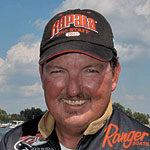
August can be tough unless you know your stuff
August has always been a tough month for bass fishermen, because the fish start getting spread out — there aren’t nearly as many grouped up — and because you might find them anywhere from around shallow docks to 25 feet deep.
You can have some rewarding days on the water this month, but you have to have a lot of areas you can go to catch fish. Instead of fishing for 15 to 20 bites a day, you’re fishing for seven or eight. You might fish 30 or 35 spots and hope for those seven or eight bites.
I think a lot of where you find them has to do with how much water flow there is in the lake you’re fishing. If you’re fishing a lake where the water is moving a lot, they might be out as deep as 25 feet, because that current allows the deeper water to carry a lot of dissolved oxygen, and the bass will stay down there because the water is cooler. But if there isn’t much current moving through a lake, you might find them coming up fairly shallow. They can stand the warmer water close to the surface better than they can stand cooler, deeper water that isn’t carrying a lot of oxygen. I think that’s why we don’t get a good, deep bite on High Rock, my home lake. They’ve been keeping the lake full all summer, so the bass haven’t moved out; they’ve stayed around the docks.
At Buggs Island or Lake Gaston, 25 feet is usually a good place to start, even though that’s almost out of range of all the crankbaits out there, except maybe the Strike King 10XD, which can get down to about 22 or 23 feet. When I was working with Lew’s to design their new line of David Fritts Crankbait Speed Stick Rods, we took those extremely big, extremely deep-diving baits into consideration.
I have always promoted fiberglass for crankbait rods, but with those big baits, we decided to make our rod blanks with about 10-percent graphite mixed in. I make one more little concession for the big plugs, and that’s spooling my BB1 reels with 12- to 15-pound Berkley Sensation instead of 10-pound test. It’s too easy to break one of those big baits off making a hard, long cast with the lighter line. And you’ve better put a lot of line on your reel, because you’ll throw half of it off on a cast.
If the lake you’re fishing has plenty of flow and you think the bass are deep, you should be looking for them on more subtle breaks; the big breaks will all have gotten hammered. You’re looking for places that drop off 2, 3 or 4 feet instead of 8 or 10. And they might get on rocks. You want to key on anything that run way out in the lake: road beds, long points, humps. There are numbers and numbers of places you can look for them when they go deep. What’s really great in a tournament is if everybody is looking for bass in 25 feet of water and you find fish at 15 feet.
If the fish really get deep where you can’t reach them with even the biggest, deepest-diving crankbait, I like to fish a Chigger Craw on a Carolina rig. Or you can fish a finesse worm on a shakey head jig. I admit it; I’ve stooped to fishing a shakey head when I didn’t think they’d bite anything else.
Here are a few more things to think about if you’re going to bass fish in August. On a lot of our lakes, you’ll find a lot of fish moving up early and late, chasing topwaters, especially lakes that have blueback herring like Buggs Island, Gaston and Norman. Second, at a place like Norman that has spotted bass, those fish will hang out longer before they go deep. You can catch spots during the week because there’s usually some flow. Next, during August, fish get what I like to call “timey.” They feed for just a little while, and if you can figure out when that is and be there, you’ll murder ‘em. You might fish a spot two or three times during a day and not catch anything, then go back one last time and catch 20 pounds without moving. Last, and I’m no expert at this, but a lot of people will fish more at night because the water is cooler and there’s not as much boat traffic. They’ll throw topwater baits and spinnerbaits — any kind of bait that gives off a lot of vibration. I know people who catch a lot of bass at night, but I’ve just never fished much after dark.
So don’t put your fishing tackle up just because dog days are approaching. There are still bass to be caught, if you pay attention to the details.




Be the first to comment